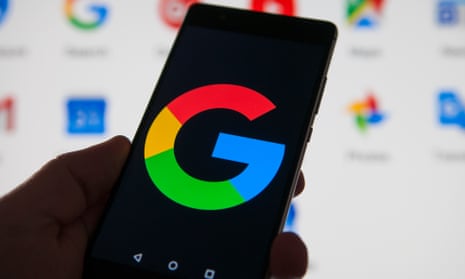Google has been hit with a landmark €4.34bn (£3.8bn) fine by the European Union over “serious illegal behaviour” to secure the dominance of its search engine on mobile phones.
The European commission imposed the record penalty after finding that the US tech firm required smartphone manufacturers to pre-install Google’s search and browser apps on devices using its Android operating system, which is used on 80% of all phones. Manufacturers that refused Google would not be allowed to use its Google Play online store and streaming service.
Margrethe Vestager, the EU’s competition commissioner, said Google has used its Android mobile phone operating system “to cement its dominance as a search engine”, preventing rivals from innovating and competing “and this is illegal under EU antitrust rules”.
Vestager added: “The vast majority of users simply take what comes with their device and don’t download competing apps.”
She added that the apps were not free as consumers “pay with their data” to use them. “Or to slightly paraphrase what [US free market economist] Milton Friedman has said: ‘there ain’t no such thing as a free search.’”
Fine of €4,34 bn to @Google for 3 types of illegal restrictions on the use of Android. In this way it has cemented the dominance of its search engine. Denying rivals a chance to innovate and compete on the merits. It’s illegal under EU antitrust rules. @Google now has to stop it
— Margrethe Vestager (@vestager) July 18, 2018
Soon after Brussels handed down its verdict, Google announced it would appeal. “Android has created more choice for everyone, not less,” a Google spokesperson said. “A vibrant ecosystem, rapid innovation and lower prices are classic hallmarks of robust competition. We will appeal the commission’s decision.”
Google has 90 days to end its “illegal conduct” or its parent company Alphabet could be hit with fines amounting to 5% of its daily turnover for each day it fails to comply.Wednesday’s verdict ends a 39-month investigation by the European commission’s competition authorities into Google’s Android operating system but it is only one part of an eight-year battle between Brussels and the tech giant.
In 2017 the commission imposed a €2.4bn (£2.1bn) penalty after finding that Google had used its dominant search engine to skew the market in favour of its internet shopping service. Google is appealing against that decision.
In a separate case, the commission has accused Google of blocking search-engine rivals on third-party websites. The case centres on Google’s AdSense product, which allows websites to install a customised search engine and benefit from advertising revenues.
In the Android case, Google was accused of breaking EU rules on three counts. First, by requiring manufacturers to pre-install Google search as the default search engine on Android devices, as a condition for licensing Google’s app store, Play Store.
The second anti-competitive behaviour was preventing smartphone manufacturers from running competing systems that had not been approved by Google. Third, Google was found to have denied consumers choice by paying manufacturers and mobile phone operators to pre-install Google Search.
“It is a very serious illegal behaviour,” Vestager said, adding that the fine was so large because these anti-competitive practices dated back to 2011. The European commission calculates fines through a formula based on the duration of the rule- breaking, the seriousness of the offence and company turnover.
The money will go to EU member states, although Google’s decision to appeal means payments will be suspended for some years.
Asked whether Google should be broken up, Vestager said she did not know if that would serve the purposes of competition, while stressing Google needed to change its ways. “This is an illegal behaviour; we want this to stop.”
Shivaun Raff, the chief executive officer of the search engine Foundem, which filed a complaint in Brussels against Google in 2010, said: “Fines make headlines. Effective remedies make a difference.” She questioned whether the Android case would lead to an effective remedy.
The decision could raise tensions with the US government before a visit to the White House by the European commission president, Jean-Claude Juncker, next week. Juncker will meet the US president, Donald Trump, on 25 July for talks on the economy, counter-terrorism, energy security, foreign policy and security.
According to Reuters, the competition authorities delayed the Google announcement by one week to avoid a clash with the Nato summit, where Trump lambasted the US’s European allies.
Vestager is already on Donald Trump’s radar, according to an account of his conversation with Juncker at last month’s G7 summit. “Your tax lady,” she really hates the US,” Trump was reported to have said.
Asked about the comment, Vestager observed dryly that she had fact-checked the statement but found it not entirely accurate: “I do work with tax and I am a woman, so this is 100% correct.”
However, she said she liked the US very much and the commission’s decisions had nothing to do with feelings. “The mission is very simple, we have to protect consumers and competition. This is what we do. It has been done before; we will continue to do it.”
Vestager, who said last month she would like a second term as EU competition commissioner, has ordered Apple to pay €13bn in underpaid taxes, and driven investigations into Amazon, Facebook, McDonald’s and Gazprom.
Asked whether the Android decision could increase the price of smartphones, she said it was Google’s job to decide on its response. She said the commission’s decision did not require price rises and in general competition makes prices come down.
